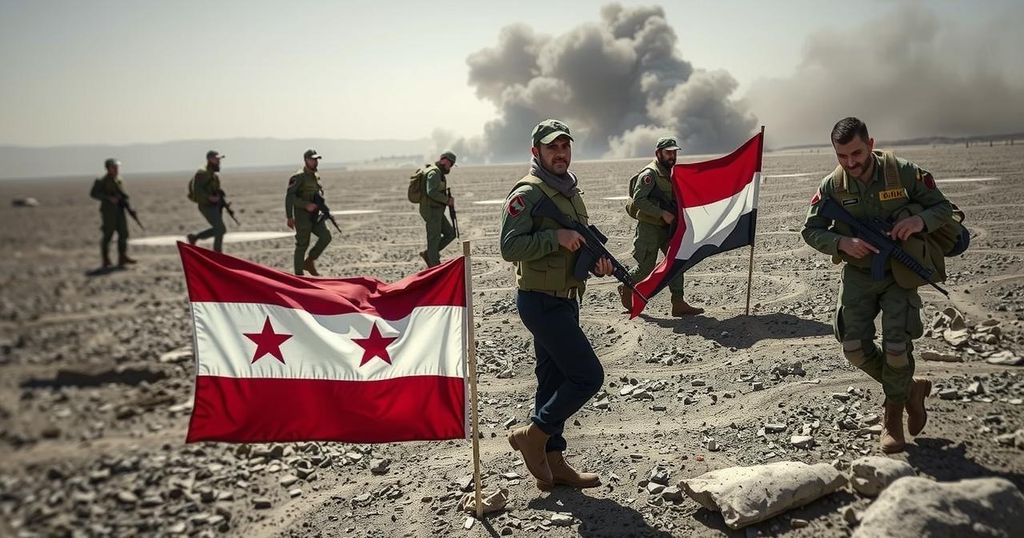Kurds in Syria Seek Concrete Actions from Israel Against Turkish Threats

Kurds in Syria are increasingly apprehensive about potential Turkish attacks and are seeking meaningful support from Israel amidst ongoing hostilities from Turkish-backed militias. They hope that international interventions, particularly from Israel, will help secure their safety and territorial integrity in the region.
On December 18, Israeli Foreign Minister Gideon Sa’ar engaged in discussions with Jens Plotner, the Foreign Policy and Security Advisor to Germany’s Chancellor. In this meeting, Sa’ar underscored the need for the international community to safeguard minorities in Syria, particularly the Kurdish population facing assaults. Many Kurds express hopes for tangible assistance from Israel beyond mere statements of support against the threats they currently encounter in Syria.
In eastern Syria, apprehensions abound among the Kurdish populace regarding potential Turkish offensives exploiting Syria’s ongoing turmoil. Historical precedents, such as Turkey’s 2018 incursion into the Afrin region, which displaced over 150,000 Kurds, have left a lasting impact. The displacement continues, as evidenced by recent attacks in Tal Rifaat, forcing Kurdish people to flee yet again.
The Autonomous Administration of North and East Syria (AANES) governs the majority of eastern Syria, supported by the Syrian Democratic Forces (SDF). Established in 2015 with U.S. backing to combat ISIS, the SDF has since been a formidable coalition of Kurds, Arabs, and Christians. Despite their victories against ISIS, the SDF faces relentless opposition from Turkey, which terms it a surrogate of the PKK, an organization classified by Ankara as terrorist. This opprobrium serves as justification for Turkey’s military strategies in the region, which involve collaborations with extremist groups notorious for human rights abuses.
Amid the ongoing conflict, the SDF retains control over key areas including Kobani and provides stability against the chaos perpetrated by Turkish-supported militias. These militias have instigated numerous assaults, using artillery against Kurdish towns, while airstrikes from Turkish drones threaten civilian areas. The SDF’s recent withdrawal from Manbij has resulted in significant local outcry against the adverse actions of Syrian National Army forces, prompting a yearning for allied intervention.
The Kurds in Syria are inquiring whether Israel will translate positive rhetoric into concrete actions. Many are asking if Israel’s involvement could extend to providing aerial support for the SDF to counter Turkish threats. Speculations regarding possible covert collaborations between Israel, the SDF, and U.S. coalition forces intensify their hopes.
As the SDF continues to confront these multi-faceted threats, the Kurdish community remains increasingly concerned about potential escalations that could undermine their autonomy and safety in the contested regions. Their efforts against ISIS have brought them to the forefront of geopolitical focus, drawing the ire of Turkey seeking to eradicate their influence and diminish U.S. military presence in Syria. The precarious balance continues as Kurds, once empowered by their resistance against ISIS, now find themselves navigating a treacherous political landscape dominated by Turkish aggressions and ideological divisions.
In summary, the Kurds are earnestly seeking assurance from the international community, particularly Israel, to stand with them in a meaningful and actionable way to safeguard their existence and territorial integrity amid escalating threats from Turkey and affiliated militias. The possibility of Israeli support, if materialized, could transform the current landscape for the Kurdish populace in Syria.
The Kurdish population in Syria has historically faced significant political and military challenges, particularly from Turkey, which views Kurdish groups as threats linked to the PKK. The Syrian Democratic Forces (SDF), which played a central role in combating ISIS with U.S. support, now find themselves in a precarious position as Turkey continues its military engagements. The geopolitical complexities involving multiple actors, including Israel, are critical to understanding the Kurds’ current security dynamics.
The Kurdish population in Syria faces dire threats from Turkish military actions and local militias, raising urgent questions about potential international support, particularly from Israel. While the SDF has been instrumental in combating ISIS, ongoing hostilities necessitate a robust response from the global community to ensure the safety and autonomy of the Kurdish people in the region. Their future reliance on geopolitical alliances has never been more critical.
Original Source: www.jpost.com






